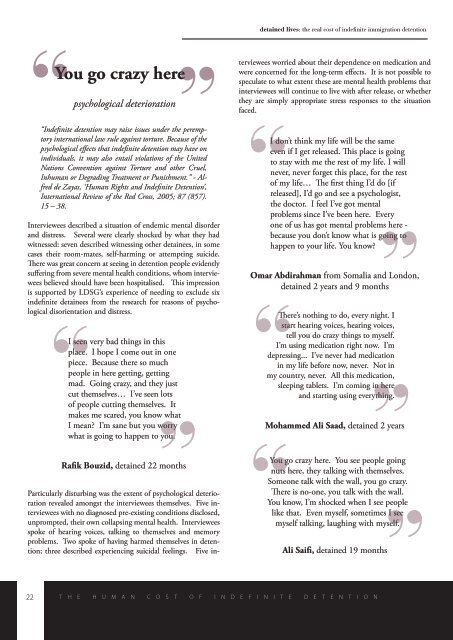Detained Lives: the real cost of indefinite ... - Detention Action
Detained Lives: the real cost of indefinite ... - Detention Action
Detained Lives: the real cost of indefinite ... - Detention Action
You also want an ePaper? Increase the reach of your titles
YUMPU automatically turns print PDFs into web optimized ePapers that Google loves.
detained lives: <strong>the</strong> <strong>real</strong> <strong>cost</strong> <strong>of</strong> <strong>indefinite</strong> immigration detention<br />
“ ”<br />
You go crazy here<br />
psychological deterioration<br />
“Indefinite detention may raise issues under <strong>the</strong> peremptory<br />
international law rule against torture. Because <strong>of</strong> <strong>the</strong><br />
psychological effects that <strong>indefinite</strong> detention may have on<br />
individuals, it may also entail violations <strong>of</strong> <strong>the</strong> United<br />
Nations Convention against Torture and o<strong>the</strong>r Cruel,<br />
Inhuman or Degrading Treatment or Punishment.” - Alfred<br />
de Zayas, ‘Human Rights and Indefinite <strong>Detention</strong>’,<br />
International Review <strong>of</strong> <strong>the</strong> Red Cross, 2005; 87 (857).<br />
15 – 38.<br />
Interviewees described a situation <strong>of</strong> endemic mental disorder<br />
and distress. Several were clearly shocked by what <strong>the</strong>y had<br />
witnessed: seven described witnessing o<strong>the</strong>r detainees, in some<br />
cases <strong>the</strong>ir room-mates, self-harming or attempting suicide.<br />
There was great concern at seeing in detention people evidently<br />
suffering from severe mental health conditions, whom interviewees<br />
believed should have been hospitalised. This impression<br />
is supported by LDSG’s experience <strong>of</strong> needing to exclude six<br />
<strong>indefinite</strong> detainees from <strong>the</strong> research for reasons <strong>of</strong> psychological<br />
disorientation and distress.<br />
“<br />
I seen very bad things in this<br />
place. I hope I come out in one<br />
piece. Because <strong>the</strong>re so much<br />
people in here getting, getting<br />
mad. Going crazy, and <strong>the</strong>y just<br />
cut <strong>the</strong>mselves… I’ve seen lots<br />
<strong>of</strong> people cutting <strong>the</strong>mselves. It<br />
makes me scared, you know what<br />
I mean? I’m sane but you worry<br />
what is going to happen to you.<br />
”<br />
Rafik Bouzid, detained 22 months<br />
Particularly disturbing was <strong>the</strong> extent <strong>of</strong> psychological deterioration<br />
revealed amongst <strong>the</strong> interviewees <strong>the</strong>mselves. Five interviewees<br />
with no diagnosed pre-existing conditions disclosed,<br />
unprompted, <strong>the</strong>ir own collapsing mental health. Interviewees<br />
spoke <strong>of</strong> hearing voices, talking to <strong>the</strong>mselves and memory<br />
problems. Two spoke <strong>of</strong> having harmed <strong>the</strong>mselves in detention;<br />
three described experiencing suicidal feelings. Five interviewees<br />
worried about <strong>the</strong>ir dependence on medication and<br />
were concerned for <strong>the</strong> long-term effects. It is not possible to<br />
speculate to what extent <strong>the</strong>se are mental health problems that<br />
interviewees will continue to live with after release, or whe<strong>the</strong>r<br />
<strong>the</strong>y are simply appropriate stress responses to <strong>the</strong> situation<br />
faced.<br />
“<br />
I don’t think my life will be <strong>the</strong> same<br />
even if I get released. This place is going<br />
to stay with me <strong>the</strong> rest <strong>of</strong> my life. I will<br />
never, never forget this place, for <strong>the</strong> rest<br />
<strong>of</strong> my life… The first thing I’d do [if<br />
released], I’d go and see a psychologist,<br />
<strong>the</strong> doctor. I feel I’ve got mental<br />
problems since I’ve been here. Every<br />
one <strong>of</strong> us has got mental problems here -<br />
”<br />
because you don’t know what is going to<br />
happen to your life. You know?<br />
Omar Abdirahman from Somalia and London,<br />
detained 2 years and 9 months<br />
There’s nothing to do, every night. I<br />
start hearing voices, hearing voices,<br />
tell you do crazy things to myself.<br />
I’m using medication right now. I’m<br />
depressing... I’ve never had medication<br />
in my life before now, never. Not in<br />
my country, never. All this medication,<br />
sleeping tablets. I’m coming in here<br />
and starting using everything.<br />
“<br />
”<br />
Mohammed Ali Saad, detained 2 years<br />
You go crazy here. You see people going<br />
nuts here, <strong>the</strong>y talking with <strong>the</strong>mselves.<br />
Someone talk with <strong>the</strong> wall, you go crazy.<br />
There is no-one, you talk with <strong>the</strong> wall.<br />
You know, I’m shocked when I see people<br />
like that. Even myself, sometimes I see<br />
“myself<br />
”<br />
talking, laughing with myself.<br />
Ali Saifi, detained 19 months<br />
22<br />
T h e h u m a n c o s t o f i n d e f i n i t e d e t e n t i o n

















